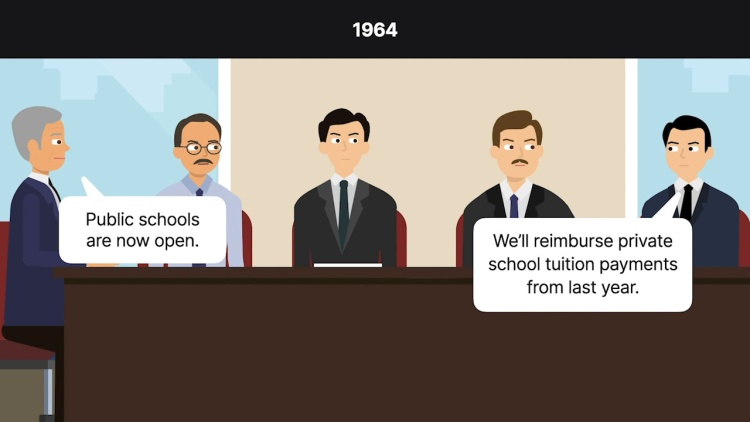Griffin v. County School Board
United States Court of Appeals for the Fourth Circuit
363 F.2d 206 (1966)

- Written by Josh Lee, JD
Facts
Prince Edward County, Virginia (the county) was ordered to desegregate its schools by the United States Supreme Court in Brown v. Board of Education, 347 U.S. 483 (1954). The county’s school board (defendant) responded by closing the public schools and paying tuition grants to parents of children attending private schools organized for white children. In 1961, the school board was ordered by the trial court to quit paying tuition grants until the public schools were reopened. On June 25, 1964, the trial court ordered that the public schools be reopened. The county and the school board appropriated funds to reopen the public schools for the following fall semester. The county then moved to pay the private-school tuition for the previous school year because the public schools were now reopened. The trial court enjoined the county from paying private tuition for the 1963-64 school year, but it did not enjoin private tuition payments for any following school year. The plaintiffs appealed to the United States Court of Appeals for the Fourth Circuit on July 17, and they moved to accelerate the appeal on July 28. The court of appeals requested that the county stipulate that it would not pay any tuition grants pending the appeal. The county responded late in the evening on August 4 that it would not make the requested stipulation. That same evening, the county board of supervisors met and enlarged the tuition grants. White parents were notified and picked up checks totaling approximately $180,000 before 9 a.m. the next day.
Rule of Law
Issue
Holding and Reasoning (Bryan, J.)
Dissent (Haynesworth, C.J.)
What to do next…
Here's why 907,000 law students have relied on our case briefs:
- Written by law professors and practitioners, not other law students. 47,100 briefs, keyed to 996 casebooks. Top-notch customer support.
- The right amount of information, includes the facts, issues, rule of law, holding and reasoning, and any concurrences and dissents.
- Access in your classes, works on your mobile and tablet. Massive library of related video lessons and high quality multiple-choice questions.
- Easy to use, uniform format for every case brief. Written in plain English, not in legalese. Our briefs summarize and simplify; they don’t just repeat the court’s language.





